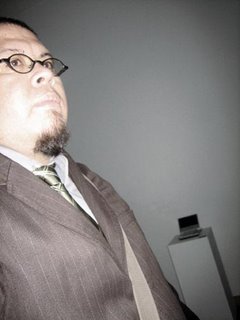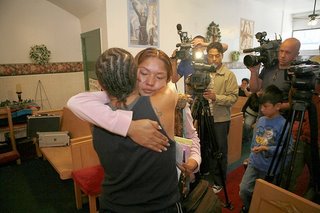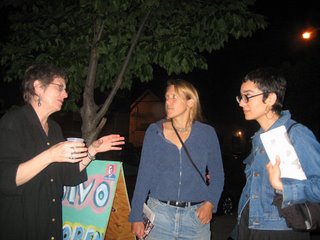







 Malachi Ritscher's apparent suicide
Malachi Ritscher's apparent suicide Art Break
Art BreakFriday 08 September 2006
ABC is frantically recutting its $40 million miniseries about 9/11 amid a blistering backlash over fictional scenes that lay the blame on the Clinton administration.
Also feeling the heat was Scholastic, which yanked a classroom guide tie-in to the program.
Former New Jersey Gov. Thomas Kean, the former head of the 9/11 commission and a paid consultant on the ABC miniseries, told the Daily News yesterday that some controversial scenes in "The Path to 9/11" were being removed or changed.
"ABC is telling me that the final version I'll be pleased with," said Kean, softening his own previous defense of the movie.
Unmollified, Democrats continued to demand that ABC yank the two-night docudrama that former President Bill Clinton's spokesman called "despicable." It is scheduled to start airing Sunday.
And Clinton's lawyer sent Kean a chiding letter expressing "shock" that a man so dedicated to accuracy had worked on a movie "that has been widely criticized for its libelous historical inaccuracies."
The chorus of outrage - ranging from Clinton cabinet members to liberal bloggers to 9/11 families to ordinary moms canceling trips to Disneyland - put ABC and parent company Disney under tremendous pressure just days before the movie's premiere.
First to go was a made-up scene showing Clinton national security adviser Sandy Berger hanging up on CIA operatives who were moments away from killing Osama Bin Laden in Afghanistan. "You will not see that in that way in the final edition," Kean said.
The Clinton White House did scotch several opportunities to kill Al Qaeda's founder because intelligence was sketchy. But unlike in the film, the CIA was never steps away from Bin Laden, nor did Berger hang up on agents in the field, Kean admitted.
Driven by the Internet's main liberal Web sites, the outrage over ABC's dramatization was reminiscent of the 2003 conservative furor that forced CBS to pull an unflattering Ronald Rea?an biopic. Phones rang off the hook and e-mail boxes were clogged all day at Scholastic Inc., ABC and Disney. "We're getting slammed," said one frazzled ABC staffer.
Scholastic caved quickly, yanking educational materials tied to the movie that critics said linked Iraq to 9/11 and glossed over the grim situation in Iraq and Afghanistan.
"We determined that the materials did not meet our high standards for dealing with controversial issues," Scholastic Chairman Dick Robinson said.
ABC released a defensive statement calling criticism of the film "premature and irresponsible" because it was still being edited. The network sent out preview DVDs weeks ago.
Democrats, noting that Republicans have vowed to campaign on terrorism this fall, saw a political conspiracy. "I think they wanted to run this before the midterm elections," said Rep. Louise Slaughter (D-N.Y.).
Several top Democratic senators, including Sens. Chuck Schumer of New York and Harry Reid of Nevada, accused ABC boss Bob Iger in a letter of airing "right-wing political propaganda" and obliquely threatened his broadcast license.
The senators said ABC should be a responsible "beneficiary of the free use of the public airwaves" and cancel the movie.
Asked if he had apologized to Clinton for inaccuracies in the movie, Kean quipped, "No, he was out campaigning against my son yesterday, so I didn't reach out to him at all!"
Kean's son is a GOP Senate candidate in New Jersey.
 Low Rider Vehicles on Parade
Low Rider Vehicles on Parade By Oscar Avila
By Oscar AvilaTuesday 15 August 2006
Taking refuge in a church, a prominent advocate for illegal immigrants publicly defied federal authorities in Chicago who were trying to deport her Tuesday.
Elvira Arellano, who became a national spokeswoman for families facing deportation, had been ordered to report to the Department of Homeland Security by 9 a.m.
Instead, Arellano appeared at the pulpit of Adalberto United Methodist Church in the Humboldt Park neighborhood, vowing before dozens of supporters that she would not return to Mexico "like a coward." She said she would stay in the church indefinitely with her 7-year-old son, a U.S. citizen.
Arellano's move, which apparently took many of her supporters by surprise, recalled the 1980s sanctuary movement, in which many liberal congregations around the U.S. took in illegal immigrants who were fleeing war in Central America.
Her supporters invoked the notion that lawbreakers can be protected in a house of worship, a tradition that dates to the ancient Greeks.
"If Homeland Security chooses to send agents to a holy place, I would know that God wants me to serve as an example of the hatred and hypocrisy of the current administration," Arellano said.
But defying the order also puts Arellano, 31, at risk of even stiffer punishment, including detention.
Because Arellano ignored her deportation order, officials with U.S. Immigration and Customs Enforcement said she is now considered a fugitive. Spokesman Tim Counts said agents have the authority to go into a church or anywhere else to make an arrest.
"We will take action at the time and place of our choosing," Counts said.
Legal experts agree that a church offers no formal protection, but they say it could put the government in an awkward position.
"Just because you are in a church doesn't mean you are less deportable in a legal sense," said Joel Fetzer, associate professor of political science at Pepperdine University. "But in a political sense, it looks very bad to be hauling people out of churches as the camera rolls."
Arellano, a cleaning woman at O'Hare International Airport, was arrested in 2002 during an immigration sweep aimed at securing the nation's aviation system after the Sept. 11, 2001, attacks. Authorities discovered she had been using a fake Social Security number to work and had previously been deported and re-entered the country illegally.
U.S. Sen. Dick Durbin (D-Ill.) and other members of the state's congressional delegation urged homeland security officials to let Arellano remain in Chicago to care for her son, Saul, born in the U.S., who has ADHD and other health problems. She was granted three stays of deportation starting in 2003.
No longer in hiding, she began to speak openly about her own experiences and became a symbol for the state's 400,000 illegal immigrants.
She took her case to Mexico President Vicente Fox and to the Statehouse in Springfield. She helped found and became president of United Latino Family, a Pilsen-based group that lobbies for families that could be split by deportation.
But some of those sympathetic to her cause, including Durbin, suggested that another stay of deportation would be harder to justify because her son's condition has improved. Immigration officials say that without a U.S. senator's request, they cannot grant such a stay.
"It is an unfortunate truth that scores of people are in the same situation as Elvira and her family," Durbin said in a statement Tuesday. "We cannot fix the injustices of this system with private bills. Only comprehensive immigration reform can permanently remedy this situation."
Now Arellano says her only option is to seek sanctuary.
In a 2003 article in a Harvard Law School journal, law professor Wayne Logan recounted how the Greeks and Romans offered limited protections to criminals who sought shelter in temples. In the 10th Century, England's civil authorities designated sanctuaries marked by a series of crosses, Logan said.
But the tradition faded, and these days, those who invoke sanctuary typically do so as a form of civil disobedience.
When churches and synagogues harbored illegal immigrants fleeing civil war in El Salvador and Guatemala in the 1980s, U.S. authorities charged and convicted several ministers. The U.S. Supreme Court in 1987 upheld the arrests, saying they did not violate freedom of religion.
But some religious leaders have said recently they are not bound to follow tough immigration laws they consider immoral. In March, Cardinal Roger Mahony in Los Angeles said he would urge priests to ignore a proposed federal law that would increase criminal penalties against those who assist illegal immigrants.
Fetzer, who has researched sanctuary movements, said that as more people face deportation, some may choose to follow Arellano's example.
Carlina Tapia-Ruano, a Chicago immigration attorney, said the defiance might make homeland security officials more determined to take action so they aren't viewed as soft on illegal immigration.
"Any attention given to this case makes the next step unpredictable, whether it is by the agency or whether it is by Elvira," said Tapia-Ruano, president of the American Immigration Lawyers Association.
Arellano's supporters say that if agents do try to make an arrest at the church, they want it to be a chaotic scene, much like the 2000 raid in which federal agents seized 6-year-old Elian Gonzalez to return him to his father in Cuba.
As her backers offered hugs and kind words, Arellano said she is prepared to pay the consequences of defying the U.S. government.
"If I have to spend 10 or 20 years in jail, I don't care," Arellano insisted. "Because I am going to fight."
By William Greider, TheNation.com.
An evil symbiosis does exist between Muslim terrorists and American politicians, but it is not the one Republicans describe. The jihadists need George W. Bush to sustain their cause. His bloody crusade in the Middle East bolsters their accusation that America is out to destroy Islam. The president has unwittingly made himself the lead recruiter of willing young martyrs.
More to the point, it is equally true that Bush desperately needs the terrorists. They are his last frail hope for political survival. They divert public attention, at least momentarily, from his disastrous war in Iraq and his shameful abuses of the Constitution. The "news" of terror -- whether real or fantasized -- reduces American politics to its most primitive impulses, the realm of fear-and-smear where George Bush is at his best.
So, once again in the run-up to a national election, we are visited with alarming news. A monstrous plot, red alert, high drama playing on all channels and extreme measures taken to tighten security.
The White House men wear grave faces, but they cannot hide their delight. It's another chance for Bush to protect us from those aliens with funny names, another opportunity to accuse Democrats of aiding and abetting the enemy.
This has worked twice before. It could work again this fall unless gullible Americans snap out of it. Wake up, folks, and recognize how stupid and wimpish you look. I wrote the following two years ago during a similar episode of red alerts: "Bush's 'war on terrorism' is a political slogan -- not a coherent strategy for national defense -- and it succeeds brillantly only as politics. For everything else, it is quite illogical."
Where is the famous American skepticism? The loose-jointed ability to laugh at ourselves in anxious moments? Can't people see the campy joke in this docudrama called "Terror in the Sky"? The joke is on them. I have a suspicion that a lot of Americans actually enjoy the occasional fright since they know the alarm bell does actually not toll for them. It's a good, scary movie, but it's a slapstick war.
The other day at the airport in Burlington, Vermont, security guards confiscated liquid containers from two adolescent sisters returning home from vacation. The substance was labeled "Pure Maple Syrup." I am reminded of the Amish pretzel factory that was put on Pennsylvania's list of targets. Mothers with babes in arms are now told they must take a swiq of their baby formula before they can board the plane. I already feel safer.
The latest plot uncovered by British authorities may be real. Or maybe not. We do not yet know enough to be certain. The early reporting does not reassure or settle anything (though the Brits do sound more convincing than former Attorney General John Ashcroft, who gave "terror alerts" such a bad reputation). Tony Blair is no more trustworthy on these matters than Bush and Cheney. British investigators are as anxious as their American counterparts to prove their vigilance (and support their leaders). The close collaboration with Pakistani authorities doesn't exactly add credibility.
One question to ask is: Why now? The police have had a "mole" inside this operation since late 2005, but have yet to explain why they felt the need to swoop down and arest alleged plotters at this moment (two days after the Connecticut primary produced a triumph for anti-war politics).
The early claim that a massive takedown of a dozen airliners was set for August 16 is "rubbish," according to London authorities. So who decided this case was ripe for its public rollout? Blair consulted Cheney: What did they decide? American economist Jamie Galbraith was on a ten-hour flight from Manchester, England, to Boston on the day the story broke, and has wittily reflected on other weak points in the official story line.
The point is, Americans are not entirely defenseless pawns. They can keep their wits and reserve judgment. They can voice loudly the skepticism that Bush and company have earned by politicizing of the so-called "war" from the very start. Leading Democrats are toughening up. Senate Minority Leader Harry Reid uses plain English to explain what the Republicans up to -- using genuine concerns of national security "as a political wedge issue. It is disgusting, but not surprising."
Instead of cowering in silence, the opposition party should start explaining this sick joke. Political confusion starts with the ill-conceived definition of a "war" that's best fought by police work, not heavy brigades on a battlefield. Forget the hype, call for common sense and stout hearts.
All we know, for sure, is that Bush and his handlers are not going to back off the fear-and-smear strategy until it loses an election for them. Maybe this will be the year.
William Greider is the author of, most recently, "The Soul of Capitalism" (Simon & Schuster).
| http://www.bignoisefilms.com/4ww/ a "must see film", we featured this film march 5, 2005: http://polvo.org/archive/4WW_flyer.pdf | |
| The Blacksmith - The boat - The paleface - Daydreams | |
 Syd Barrett, founder of Pink Floyd, dies
Syd Barrett, founder of Pink Floyd, dies






 I promise this will be the last piece of art in my "recycle" series. So far I have done bumper stickers(see previous posts), digital photo documentation of the sickers in public, a computer drawing(below) and now this internet flash file. Click on the image...Enjoy!
I promise this will be the last piece of art in my "recycle" series. So far I have done bumper stickers(see previous posts), digital photo documentation of the sickers in public, a computer drawing(below) and now this internet flash file. Click on the image...Enjoy! Recycle your ideas
Recycle your ideas








